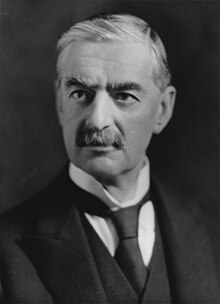The Norway Debate, sometimes called the Narvik Debate, was a momentous debate in the British House of Commons from 7 to 9 May 1940, during the Second World War. The official title of the debate, as held in the Hansard parliamentary archive, is Conduct of the War. The debate was initiated by an adjournment motion enabling the Commons to freely discuss the progress of the Norwegian campaign. The debate quickly brought to a head widespread dissatisfaction with the conduct of the war by Neville Chamberlain's government.

At the end of the second day, there was a division of the House for the members to hold a no confidence motion.[a] The vote was won by the government but by a drastically reduced majority. That led on 10 May to Chamberlain resigning as prime minister and the replacement of his war ministry by a broadly based coalition government, which, under Winston Churchill, governed the United Kingdom until after the end of the war in Europe in May 1945.
Chamberlain's government was criticised not only by the Opposition but also by respected members of his own Conservative Party. The Opposition forced the vote of no confidence, in which over a quarter of Conservative members voted with the Opposition or abstained, despite a three-line whip. There were calls for national unity to be established by formation of an all-party coalition but it was not possible for Chamberlain to reach agreement with the opposition Labour and Liberal parties. They refused to serve under him, although they were willing to accept another Conservative as prime minister. After Chamberlain resigned as prime minister (he remained Conservative Party leader until October 1940), they agreed to serve under Churchill.
Cite error: There are <ref group=lower-alpha> tags or {{efn}} templates on this page, but the references will not show without a {{reflist|group=lower-alpha}} template or {{notelist}} template (see the help page).